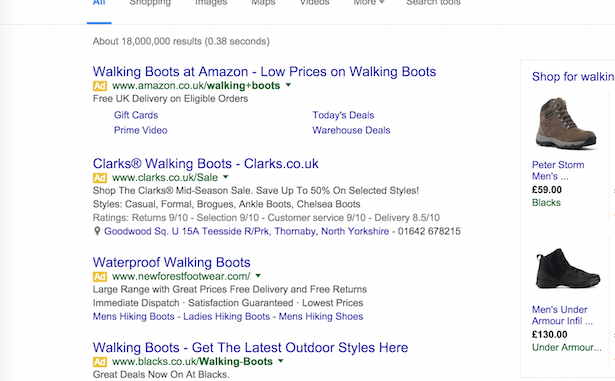
A report by Ofcom has found that just 60% of adults can realise that PPC ads in search results are in fact adverts.
The report by Ofcom, the communications regulator in the UK, finds that, despite the yellow ‘ad’ labels on paid search results, many people think these are the best results, or those that have proved to be the most popular.
For Ofcom’s study, ‘adults who use search engines’ were shown a picture of the SERPs for ‘walking boots’.
This is what that SERP looks like today, but the study was carried out last year, so the shopping results were not there at that time, and there are four paid ads. As the study says:
“Their attention was drawn to the first three results at the top of the list, which were distinguished by an orange box with the word ‘Ad’ written in it. They were then prompted with three options and asked whether any of these applied to these first three results.”
The 1,328 survey respondents were asked the following about the top three results
These are adverts/ sponsored links/ paid to appear here.
These are the best results/ the most relevant results.
These are the most popular results used by other people
They were allowed to select more than one answer so, for example, some may have said that the ads were both paid links and the best results.
Understanding of paid-for results returned by Google searches, among adults who use search engine websites or apps:
To clarify the results, 60% identified them as paid links, while 49% identified them only as paid ads, i.e. they selected only the correct answer.
Ofcom also split the results out between newer and more established internet users. Newer users in this case are defined as those who first went online less than five years ago. There were 160 newer users surveyed, and 1,113 older users.
These are the response to the same question as before, just split by old and new:
In a nutshell: newer users were less likely to identify that the results with the yellow ad label were indeed paid results. 34% of newer and 51% of established users gave only the correct answer.
The results are surprising taken in isolation, though this isn’t the first study to find that some web users are unaware of the difference between paid and organic results.
It’s possible that this is a form of banner blindness, i.e. that web users have become accustomed to ignoring certain elements on web pages that are less relevant to them.
I’ve discussed the results and possible reasons in much more detail on Search Engine Watch…
Source: ClickZ
Link: A majority of web users don’t recognise ads in search results: report



Leave a Reply